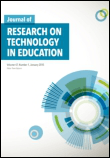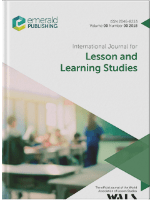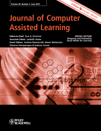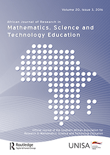
Journal of Research on Technology in Education
Scope & Guideline
Advancing Educational Excellence with Innovative Tech Insights.
Introduction
Aims and Scopes
- Technology Integration in Education:
The journal emphasizes research on the integration of various technological tools in educational settings, assessing their impact on teaching effectiveness and student engagement. - Computational Thinking and STEM Education:
There is a strong focus on the development of computational thinking skills and STEM education, particularly how these areas can be enhanced through innovative teaching strategies and technologies. - Equity and Access in Education:
The journal addresses issues of equity and access, particularly in computer science education, emphasizing culturally responsive practices and the engagement of underrepresented groups. - Professional Development for Educators:
Research on professional development strategies for educators to effectively integrate technology into their teaching practices is a core area, highlighting the importance of teacher training in technology use. - Learning Analytics and Educational Outcomes:
The journal explores the use of learning analytics to improve educational outcomes, focusing on how data can inform teaching practices and learner engagement. - Innovative Educational Practices:
It encourages research on innovative pedagogical practices, including the use of gamification, virtual reality, and other emerging technologies in education.
Trending and Emerging
- Artificial Intelligence in Education:
There is a growing trend of research focusing on the implications of artificial intelligence in educational contexts, including its role in personalized learning and assessment. - Culturally Responsive Teaching Practices:
Emerging themes highlight the importance of culturally responsive pedagogy, particularly in computer science education, to support diverse learners and address equity issues. - Gamification and Game-Based Learning:
An increase in studies related to gamification and game-based learning indicates a trend towards using game mechanics to enhance student motivation and engagement. - Learning in Remote and Hybrid Environments:
The response to the COVID-19 pandemic has led to a surge in research on effective practices for remote and hybrid learning environments, exploring how technology can facilitate learning in these contexts. - Social Media and Digital Citizenship:
Research on the role of social media in education and the importance of digital citizenship is gaining traction, reflecting broader societal concerns about online behavior and information literacy.
Declining or Waning
- Traditional Pedagogical Approaches:
Research focusing on traditional pedagogical methods is becoming less frequent as the emphasis shifts toward technology-enhanced learning and innovative teaching practices. - General Technology Use without Specific Contexts:
Papers that discuss technology use in a vague or general context, without specific applications or educational frameworks, are declining as the field moves towards more focused and context-rich studies. - Non-Interactive Educational Technologies:
There is a waning interest in studies related to passive or non-interactive technologies, as the educational community increasingly recognizes the importance of interactivity in engaging students.
Similar Journals

International Journal for Lesson and Learning Studies
Bridging theory and practice for impactful teaching.International Journal for Lesson and Learning Studies, published by Emerald Group Publishing Ltd, stands as a pivotal forum for researchers, educators, and practitioners in the field of education. With an ISSN of 2046-8253 and an E-ISSN of 2016-8261, this journal emerged as a valuable resource for academic discourse from 2012, continuously evolving until 2024. Classified in the Q3 category for 2023 within the education sector, it has established itself with a commendable Scopus rank of #516 out of 1543, positioning it in the 66th percentile among its peers. The journal's commitment to enhancing understanding and innovation in lesson study and learning processes is complemented by its strategic focus on scholarly contributions that bridge theory and practice, while fostering collaborative research efforts. Although it doesn't offer open access, the journal remains accessible to a diverse international audience, promoting significant insights into effective teaching methodologies and educational advancements.

Informatics in Education
Bridging Technology and Pedagogy for Tomorrow's EducatorsInformatics in Education is a premier academic journal published by Vilnius University, Institute of Mathematics and Informatics, focusing on the intersection of information technology and pedagogical innovation. With an ISSN of 1648-5831 and an E-ISSN of 2335-8971, this Open Access journal has been disseminating critical research since 2003, enabling widespread accessibility and collaboration across the global educational community. The journal's commitment to advancing the field is demonstrated by its impressive 2023 Category Quartiles: Q1 in Communication and Education and Q2 in Computer Science Applications, highlighting its significant impact on these disciplines. Located in Lithuania, Informatics in Education ranks impressively in Scopus, with a Social Sciences Communication rank of #54/511 (89th percentile) and a Social Sciences Education rank of #188/1543 (87th percentile). The journal's goals include fostering research that informs pedagogical practices and enhances educational outcomes through the innovative use of technology, ensuring it remains at the forefront of research in this vital field. Researchers, professionals, and students alike will find a wealth of knowledge within its pages to support their work and learning endeavors.

Bulletin of the Technical Committee on Learning Technology
Advancing the Future of Learning TechnologyBulletin of the Technical Committee on Learning Technology, published by IEEE-INST ELECTRICAL ELECTRONICS ENGINEERS INC, is a pivotal journal that intersects the realms of education and computer science. With a noteworthy ISSN of 2306-0212, this journal serves as a vital platform for disseminating innovative research and development in learning technologies, particularly focusing on technological advancements that enhance educational environments and methodologies. Although coverage in Scopus has been discontinued, the journal's past contributions are reflected in its competitive rankings, with a position of Rank #624 in Social Sciences - Education and Rank #427 in Computer Science - Computer Science Applications. This indicates a solid niche in the academic landscape, making it a valuable resource for researchers, educators, and practitioners seeking to advance the dialogue around technology integration in learning. The Bulletin fosters an open exchange of knowledge and encourages the exploration of emerging technology applications in education, positioning itself as an important component in the ongoing development of learning technologies.

Contemporary Educational Technology
Transforming Teaching with Cutting-Edge TechContemporary Educational Technology is a premier journal published by BASTAS PUBL LTD - UK, specializing in the dynamic intersection of educational practices and technological advancements. With an E-ISSN of 1309-517X, this journal serves as a vital resource for researchers, educators, and professionals keen to explore innovative solutions and methodologies in education. Ranked in the Q2 category for both Education and Management of Technology and Innovation in 2023, Contemporary Educational Technology boasts impressive Scopus ranks, standing at #187 out of 1543 in the Social Sciences Education field, reflecting its influence and contribution to contemporary research. Through its open-access approach, this journal facilitates the dissemination of knowledge, making cutting-edge research readily available to a global audience. By examining developments from 2018 through 2024, it aims to critically analyze and promote the integration of technology in educational contexts, thereby fostering improved learning outcomes and innovative teaching practices.

Journal of Teaching and Learning
Enhancing learning outcomes with cutting-edge research.The Journal of Teaching and Learning, published by the University of Windsor, Faculty of Education, is a prominent open-access journal in the field of education, dedicated to fostering scholarly discussion and exploration. Since its inception in 2001, it has served as a vital platform for researchers, educators, and practitioners to share innovative insights and evidence-based practices that advance teaching and learning methodologies. With an impact factor reflective of its category quartiles, it currently ranks in the Q3 category for education according to the 2023 evaluation, standing at 834 out of 1543 in Scopus's social sciences education rankings. This journal aims to bridge theoretical frameworks with practical applications, providing a robust resource for those invested in enhancing educational outcomes. With an open-access model, the Journal of Teaching and Learning ensures that its contributions are readily accessible to a global audience, encouraging the dissemination of knowledge and collaborative learning experiences. The journal is published in Canada and welcomes submissions that explore current trends and future directions in teaching practices, learner engagement, and educational policy.

ETR&D-EDUCATIONAL TECHNOLOGY RESEARCH AND DEVELOPMENT
Transforming Educational Landscapes with Research InsightsETR&D - Educational Technology Research and Development, published by Springer, is a premier journal dedicated to advancing the field of educational technology through rigorous research and development. With a history dating back to 1957, it has established itself as a leading resource for scholars and practitioners, maintaining a remarkable Q1 ranking in Education as of 2023, and standing at an impressive 41st out of 1543 in the Scopus rankings for Social Sciences - Education, placing it in the 97th percentile. This journal aims to bridge the gap between theory and practice, offering in-depth insights into the latest innovations and methodologies in educational technology. As a vital resource for researchers, educators, and technology developers, ETR&D highlights the interplay of technology, pedagogy, and learning environments, driving the evolution of educational practices in a digital era. Although not an open access journal, it provides comprehensive access options for institutional and individual subscribers, ensuring that key findings reach a broad audience. Discover the future of education through ETR&D's influential publications.

JOURNAL OF COMPUTER ASSISTED LEARNING
Revolutionizing Learning Experiences with TechnologyWelcome to the JOURNAL OF COMPUTER ASSISTED LEARNING, a premier publication dedicated to the advancement of research in the fields of computer science applications, education, and e-learning. Published by WILEY, this journal has earned a prestigious reputation, holding a Q1 quartile ranking in both its primary categories for the year 2023. With its extensive reach since its inception in 1985, it features cutting-edge research that stimulates innovative practices in educational technology and pedagogical methods. Recognized for its impact with a remarkable Scopus ranking — 57th in Social Sciences/Education and 105th in Computer Science — the journal is a vital resource for scholars, educators, and practitioners looking to deepen their understanding of how technology enhances learning experiences. Although the journal is not open access, its commitment to quality research continues to resonate across the UK and globally, making it an essential platform for those engaged in enhancing educational outcomes through technology.

ReiDoCrea-Revista Eectronica de Investigacion y Docencia Creativa
Exploring New Frontiers in Educational ResearchReiDoCrea-Revista Electrónica de Investigación y Docencia Creativa is a distinguished academic journal published by UNIV GRANADA, FAC CIENCIAS EDUCACION, aimed at advancing research and innovative teaching practices in the field of education. With its inception in 2012, this Open Access journal ensures that research findings and educational strategies are accessible to a global audience, fostering collaboration and development among educators, researchers, and students. While its H-index is currently not specified, ReiDoCrea is committed to publishing high-quality, peer-reviewed articles that stimulate scholarly dialogue and reflection on pedagogical innovation. Its relevance in the educational landscape is underscored by its focus on creative approaches to teaching and learning, making it an essential resource for those seeking to enhance educational practices. With a commitment to impactful research dissemination, ReiDoCrea provides a vital platform for sharing insights and innovations that contribute to the evolution of educational methodologies.

African Journal of Research in Mathematics Science and Technology Education
Fostering Innovation in African Science EducationAfrican Journal of Research in Mathematics Science and Technology Education is a distinguished academic journal, published by Routledge Journals, Taylor & Francis Ltd, dedicated to advancing knowledge in the fields of mathematics, science, and technology education within the African context. With an ISSN of 1811-7295 and an E-ISSN of 2469-7656, this journal has been a crucial platform for scholarly discourse since its inception in 1997, steadily gaining reputation and impact among researchers, educators, and policymakers. The journal features a rigorous peer-review process, ensuring that high-quality research garners visibility across various disciplines, as evidenced by its Quartile rankings in Computer Science Applications, Education, Engineering, Mathematics, and Physics and Astronomy. With its commitment to serving the educational community and fostering innovative practices, the African Journal of Research in Mathematics Science and Technology Education plays a pivotal role in shaping the future of STEM education in Africa and beyond.

Journal of Science Education and Technology
Bridging Science and Technology for Enhanced Learning.The Journal of Science Education and Technology, published by SPRINGER, stands as a premier platform in the fields of education and engineering, recognized with a prestigious Q1 ranking in both categories as of 2023. With an ISSN of 1059-0145 and an E-ISSN of 1573-1839, this journal serves as a pivotal resource for researchers, educators, and practitioners alike, emphasizing the integration of scientific inquiry and technological advancements in educational contexts. Since its inception in 1992, the journal has consistently provided high-quality, peer-reviewed research that shapes contemporary practices and methodologies in science education. With its notable Scopus rankings, including a 95th percentile in Social Sciences Education, the journal is essential for anyone eager to enhance their understanding of effective teaching in STEM fields. While the journal is not open access, its contributions are invaluable to advancing knowledge and innovations that are crucial for the progressive education landscape, making it a must-read for scholars and students committed to excellence in science education.